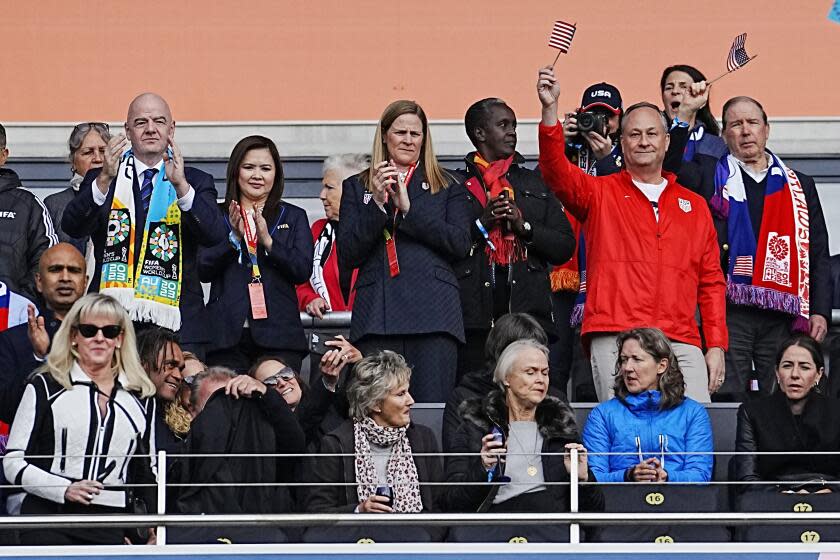'It's not fair.' Doug Emhoff visits Angel City to discuss fighting gender equity gap

For Doug Emhoff, the second gentleman of the United States, gender inequity isn’t complicated. It’s simply wrong.
“It’s not right. It’s not fair,” he said Wednesday during a brief visit to the practice facility for Angel City FC, the NWSL team that trains at Cal Lutheran University in Thousand Oaks.
“It’s actually discrimination,” he said. “There is a misconception out there that if somehow a woman is succeeding, some guy out there is not. That’s not true. Women succeed, we all get lifted up.”
And the disparities may be starkest in professional sports. While women in the workplace make 16% less than men for doing the same job, the minimum wage in the NWSL is about 40% of what it is in MLS, a difference of nearly $50,000. In basketball, the gap between the base salary for the first pick in the WNBA draft and NBA is more than $1 million.
Read more: Alex Morgan left off USWNT's Olympic roster, likely ending international run
“This is about more than compensation,” Emhoff said. “It’s about respect. It’s about dignity.”
The second gentleman’s appearance alongside Angel City co-owner Lorrie Fair Allen and Angela Hucles Mangano, the team’s general manager, amounted to little more than a photo opportunity. But it was meant to highlight the Biden-Harris administration’s commitment to gender equity.
As a California senator, Kamala Harris — the vice president and Emhoff’s wife — sponsored the Domestic Workers Bill of Rights Act and the Paycheck Fairness Act, which both addressed pay inequities. And last year President Biden approved a law requiring that all athletes representing the U.S. in global competition receive equal pay and benefits, regardless of gender.
“A lot of what I do is talk about equity and unfairness and tackling that, and what role can men play in helping,” Emhoff said. “It’s just the right thing to do.”
Emhoff, who graduated from Agoura Hills High, toured Angel City’s offices and chatted with players in the team’s gym, which is generally off limits to visitors. The groundwork for the visit was laid last summer, when Emhoff met Fair, a former world champion and Olympic medalist as a player, at the women’s World Cup in New Zealand.
Read more: Angel City and San Diego Wave are rivals on the pitch and strong collaborators off it
“He’s leaning into the work around gender equity. It’s personal to him,” Fair said. “And it’s not just like gender equity around sport. It’s across the entire workforce, talking about women’s access, family leave, parental leave, child care, affordable child care, valuing some of the some of the jobs that are traditionally held by women.”
Emhoff is a soccer fan, having met with the Chelsea women’s team last fall before attending the NWSL Challenge Cup in March. That has made it easy to match his passion with his purpose.
“This sport is a universal language,” said Hucles, a former teammate of Fair who played for nearly a decade with the women’s national team. “I witnessed football as a vehicle for advocacy and positive change. Our unique platforms promote positive change, specifically when we’re talking about gender equity. The origin story of this club began with changing the narrative and shifting culture around gender equity and pay discrepancy to women.”
Which is another reason the second gentleman chose Angel City to promote the administration’s gender-equity policies. Since its inception in summer 2020, the club and its sprawling group of more than 100 owners — the largest women-led ownership group in professional sports history — has leveraged its unique platform to make a difference in at-risk communities.
Read more: Why Angel City's Alexis Ohanian, other investors bet on women's soccer
Angel City pioneered an innovative model that reallocates 10% of sponsorship revenues to community initiatives focusing on equity, essentials and education. That will redirect at least $7 million to Southern California over the next three to five years.
In addition, the team mobilized more than 1,700 volunteers for local programs, contributing more than 5,400 collective hours of community service; created an alternative to the pay-for-play model by creating more equitable opportunities for girls and gender-expansive individuals to play sports; and more than doubled girls’ participation across two youth sports programs.
“For me it’s a great breakthrough,” said Richard Lapchick, president of the Institute for Diversity and Ethics in Sport at the University of Central Florida.
Read more: Brandi Chastain's iconic moment aided women's movement from field to owner's box
“This team is going to be looked at as a team of social justice warriors as well as the team of vanguard athletes,” he said.
All that work has earned Angel City attention not just from the White House but from ESPN as well, with the network choosing the team as one of four nominees for the Sports Humanitarian Team of the Year award at next month’s ESPYs.
“I met Lorrie during the World Cup, and we started talking about the all the things that weren’t working. At Angel City they are working,” Emhoff said. “This is my hometown. I’m from here, and I wanted to come here to support this team that’s doing the right thing right in my hometown.”
This story originally appeared in Los Angeles Times.


